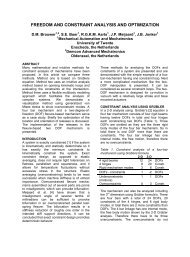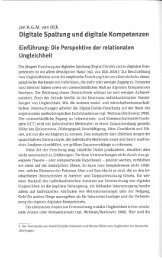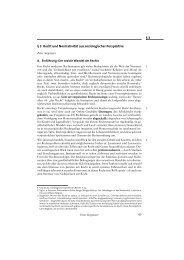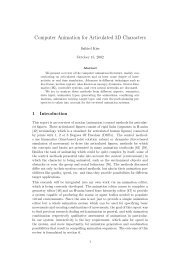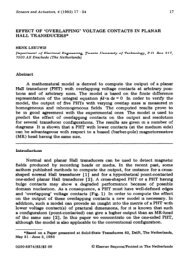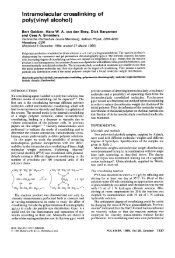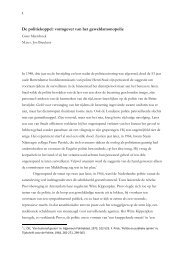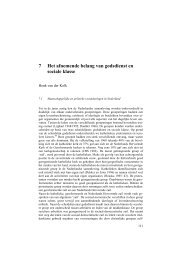Innovation and institutional change: the transition to a sustainable ...
Innovation and institutional change: the transition to a sustainable ...
Innovation and institutional change: the transition to a sustainable ...
Create successful ePaper yourself
Turn your PDF publications into a flip-book with our unique Google optimized e-Paper software.
158 Chapter 5<br />
add, not a sufficient condition for <strong>the</strong> sharp uptake in cogeneration in <strong>the</strong><br />
Ne<strong>the</strong>rl<strong>and</strong>s.<br />
The uptake of cogeneration has transformed <strong>the</strong> Dutch electricity system <strong>and</strong><br />
transformation of <strong>the</strong> Dutch electricity system has facilitated <strong>the</strong> uptake of<br />
cogeneration. Thus, one major conclusion is that <strong>the</strong> rise of cogeneration<br />
needs <strong>to</strong> be unders<strong>to</strong>od in <strong>the</strong> process of reorganisation of <strong>the</strong> electricity<br />
sec<strong>to</strong>r, <strong>and</strong> especially in <strong>the</strong> light of diverging (<strong>and</strong> at certain times<br />
competing) strategies in distribution <strong>and</strong> production companies. It is relevant<br />
<strong>to</strong> stress this element of competition in <strong>the</strong> light of <strong>the</strong> foremost consensusoriented<br />
<strong>transition</strong> policy that is currently undertaken. Ano<strong>the</strong>r conclusion is<br />
that <strong>the</strong> uptake of cogeneration is part of more broader process of societal<br />
<strong>change</strong> that in <strong>the</strong> 1970s included <strong>the</strong> end of <strong>the</strong> idea of unlimited growth for<br />
<strong>the</strong> progress of all, <strong>and</strong> involved a broader social movement against <strong>the</strong><br />
technocratic style of decision-making, especially reflected in <strong>the</strong> discussion<br />
on nuclear energy in <strong>the</strong> 1970s where <strong>the</strong> establishment saw nuclear energy<br />
as solution <strong>to</strong> <strong>the</strong> problem, whereas groups in civil society saw it as part of<br />
<strong>the</strong> problem <strong>and</strong> advocated a different design of <strong>the</strong> electricity system.<br />
Advocates of this different design, such as <strong>the</strong> Center for Energy Saving <strong>and</strong><br />
<strong>the</strong> Rethink Energy Policy Group 34 , played a central role as <strong>the</strong>y advanced<br />
<strong>the</strong>se alternative ideas relative <strong>to</strong> <strong>the</strong> dominant thinking of <strong>the</strong> electricity<br />
sec<strong>to</strong>r <strong>and</strong> government at that time, but also because <strong>the</strong>y slowly became part<br />
of <strong>the</strong> <strong>change</strong> process as <strong>the</strong>y entered circles of decision making or catalysed<br />
knowledge <strong>and</strong> consultancy centers regarding <strong>the</strong>se alternative routes.<br />
Processes of <strong>change</strong> are thus also people-related <strong>and</strong> dependent as also <strong>the</strong><br />
emergence of Winsemius shows <strong>and</strong> <strong>the</strong> <strong>change</strong>s in organisation <strong>and</strong><br />
routines he initiated in <strong>the</strong> department of Environmental Affairs.<br />
Overall, <strong>the</strong> way <strong>the</strong> electricity system is embedded in society has<br />
fundamentally <strong>change</strong>d. The reduction of legitimacy <strong>and</strong> credibility of <strong>the</strong><br />
central station electricity system has initially led <strong>to</strong> de-<strong>institutional</strong>isation of<br />
its linkages <strong>to</strong> wider fields in society. Instead a more dem<strong>and</strong>-oriented<br />
electricity system biased <strong>to</strong>wards cogeneration gained legitimacy <strong>and</strong> was<br />
supported by <strong>institutional</strong> <strong>change</strong>s. The process of liberalisation however has<br />
set in motion diverging processes. On <strong>the</strong> one h<strong>and</strong>, a re-<strong>institutional</strong>isation<br />
of <strong>the</strong> central station electricity system has taken place at a cross-national<br />
level as national electricity markets opened. This system is also deriving<br />
legitimacy based on high expectations for integration of large-scale<br />
renewable energy resources such as off-shore wind farms, co-combustion of<br />
coal-fired power plants with biomass (Raven, 2005), <strong>and</strong> biomass based<br />
power plants. Even <strong>the</strong> nuclear option might re-emerge in <strong>the</strong> light of <strong>the</strong><br />
Kyo<strong>to</strong>-pro<strong>to</strong>col <strong>and</strong> long-term security of supply. On <strong>the</strong> o<strong>the</strong>r h<strong>and</strong><br />
34 In Dutch: Bezinningsgroep Energiebeleid.



